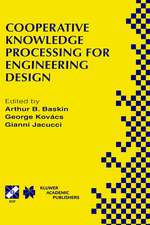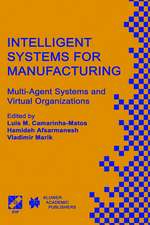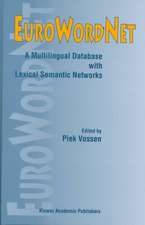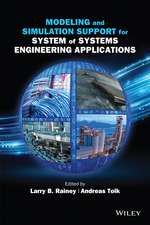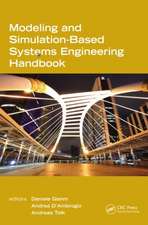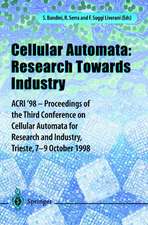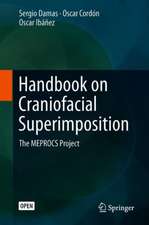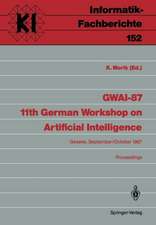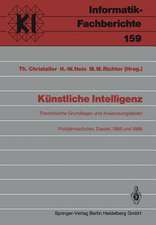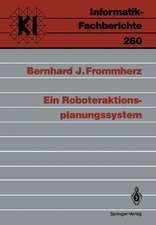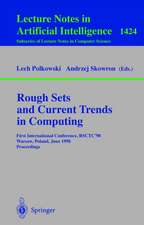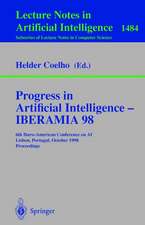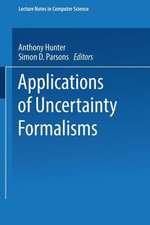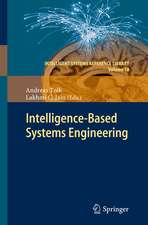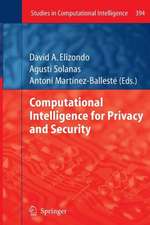Ontology, Epistemology, and Teleology for Modeling and Simulation: Philosophical Foundations for Intelligent M&S Applications: Intelligent Systems Reference Library, cartea 44
Editat de Andreas Tolken Limba Engleză Paperback – 20 sep 2014
It is well understood that a simulation can provide the technical means to display the behavior of a system over time, including following observed trends to predict future possible states, but how reliable and trustworthy are such predictions? The questions about what we can know (ontology), how we gain new knowledge (epistemology), and what we do with this knowledge (teleology) are therefore illuminated from these very different perspectives, as each experts uses a different facet to look at these challenges. The result of bringing these perspectives into one book is a challenging compendium that gives room for a spectrum of challenges: from general philosophy questions, such as can we use modeling and simulation and other computational means at all to discover new knowledge, down to computational methods to improve semantic interoperability between systems or methods addressing how to apply the recent insights of service oriented approaches to support distributed artificial intelligence.
As such, this book has been compiled as an entry point to new domains for students, scholars, and practitioners and to raise the curiosity in them to learn more to fully address the topics of ontology, epistemology, and teleology from philosophical, computational, and conceptual viewpoints.
| Toate formatele și edițiile | Preț | Express |
|---|---|---|
| Paperback (1) | 991.79 lei 6-8 săpt. | |
| Springer Berlin, Heidelberg – 20 sep 2014 | 991.79 lei 6-8 săpt. | |
| Hardback (1) | 998.04 lei 6-8 săpt. | |
| Springer Berlin, Heidelberg – 8 aug 2012 | 998.04 lei 6-8 săpt. |
Din seria Intelligent Systems Reference Library
- 20%
 Preț: 1050.59 lei
Preț: 1050.59 lei - 20%
 Preț: 1157.60 lei
Preț: 1157.60 lei - 20%
 Preț: 648.44 lei
Preț: 648.44 lei - 20%
 Preț: 650.08 lei
Preț: 650.08 lei - 20%
 Preț: 1005.64 lei
Preț: 1005.64 lei - 5%
 Preț: 968.90 lei
Preț: 968.90 lei - 20%
 Preț: 1052.67 lei
Preț: 1052.67 lei - 20%
 Preț: 1171.46 lei
Preț: 1171.46 lei - 20%
 Preț: 1164.84 lei
Preț: 1164.84 lei - 20%
 Preț: 815.84 lei
Preț: 815.84 lei - 20%
 Preț: 989.96 lei
Preț: 989.96 lei - 20%
 Preț: 1063.41 lei
Preț: 1063.41 lei - 20%
 Preț: 925.45 lei
Preț: 925.45 lei - 20%
 Preț: 504.38 lei
Preț: 504.38 lei - 18%
 Preț: 1113.26 lei
Preț: 1113.26 lei - 20%
 Preț: 1920.04 lei
Preț: 1920.04 lei - 20%
 Preț: 990.62 lei
Preț: 990.62 lei - 20%
 Preț: 651.57 lei
Preț: 651.57 lei - 20%
 Preț: 645.97 lei
Preț: 645.97 lei - 20%
 Preț: 660.16 lei
Preț: 660.16 lei - 20%
 Preț: 647.13 lei
Preț: 647.13 lei - 20%
 Preț: 654.05 lei
Preț: 654.05 lei - 20%
 Preț: 649.93 lei
Preț: 649.93 lei - 20%
 Preț: 648.11 lei
Preț: 648.11 lei - 20%
 Preț: 657.99 lei
Preț: 657.99 lei - 20%
 Preț: 656.84 lei
Preț: 656.84 lei - 20%
 Preț: 1624.04 lei
Preț: 1624.04 lei - 20%
 Preț: 642.98 lei
Preț: 642.98 lei - 20%
 Preț: 649.60 lei
Preț: 649.60 lei - 20%
 Preț: 651.23 lei
Preț: 651.23 lei - 20%
 Preț: 653.06 lei
Preț: 653.06 lei - 20%
 Preț: 1002.99 lei
Preț: 1002.99 lei - 20%
 Preț: 645.14 lei
Preț: 645.14 lei - 20%
 Preț: 658.33 lei
Preț: 658.33 lei - 20%
 Preț: 644.98 lei
Preț: 644.98 lei - 20%
 Preț: 646.62 lei
Preț: 646.62 lei
Preț: 991.79 lei
Preț vechi: 1239.74 lei
-20% Nou
Puncte Express: 1488
Preț estimativ în valută:
189.80€ • 206.10$ • 159.43£
189.80€ • 206.10$ • 159.43£
Carte tipărită la comandă
Livrare economică 22 aprilie-06 mai
Preluare comenzi: 021 569.72.76
Specificații
ISBN-13: 9783642442810
ISBN-10: 3642442811
Pagini: 392
Ilustrații: XX, 372 p.
Dimensiuni: 155 x 235 x 21 mm
Greutate: 0.55 kg
Ediția:2013
Editura: Springer Berlin, Heidelberg
Colecția Springer
Seria Intelligent Systems Reference Library
Locul publicării:Berlin, Heidelberg, Germany
ISBN-10: 3642442811
Pagini: 392
Ilustrații: XX, 372 p.
Dimensiuni: 155 x 235 x 21 mm
Greutate: 0.55 kg
Ediția:2013
Editura: Springer Berlin, Heidelberg
Colecția Springer
Seria Intelligent Systems Reference Library
Locul publicării:Berlin, Heidelberg, Germany
Public țintă
ResearchCuprins
From the Contents: Truth, Trust, and Turing – Constraints for Modeling and Simulation.- Guidelines for Developing Ontological Architectures in Modeling and Simulation.- Ontologies in Modeling and Simulation: An Epistemological Perspective.- Ontological Implications of Modeling and Simulation in Postmodernity.- Models as Partial Explanations.- Theory Reconstruction of Several Versions of Modern Organization Theories.- Cutting Back Models and Simulations.- Philosophical Aspects of Modeling and Simulation.- Philosophical and Theoretic Underpinnings of Simulation Visualization Rhetoric and their Practical Implications.
Recenzii
From the reviews:
Selected by Computing Reviews as one of the Best Reviews & Notable Books of 2013
“The clarity and style of writing make them accessible to readers coming from the sciences, engineering, or economics. … This is a book worth reading and rereading.” (Anthony J. Duben, Computing Reviews, August, 2013)
Selected by Computing Reviews as one of the Best Reviews & Notable Books of 2013
“The clarity and style of writing make them accessible to readers coming from the sciences, engineering, or economics. … This is a book worth reading and rereading.” (Anthony J. Duben, Computing Reviews, August, 2013)
Textul de pe ultima copertă
In this book, internationally recognized experts in philosophy of science, computer science, and modeling and simulation are contributing to the discussion on how ontology, epistemology, and teleology will contribute to enable the next generation of intelligent modeling and simulation applications.
It is well understood that a simulation can provide the technical means to display the behavior of a system over time, including following observed trends to predict future possible states, but how reliable and trustworthy are such predictions? The questions about what we can know (ontology), how we gain new knowledge (epistemology), and what we do with this knowledge (teleology) are therefore illuminated from these very different perspectives, as each experts uses a different facet to look at these challenges. The result of bringing these perspectives into one book is a challenging compendium that gives room for a spectrum of challenges: from general philosophy questions, such as can we use modeling and simulation and other computational means at all to discover new knowledge, down to computational methods to improve semantic interoperability between systems or methods addressing how to apply the recent insights of service oriented approaches to support distributed artificial intelligence.
As such, this book has been compiled as an entry point to new domains for students, scholars, and practitioners and to raise the curiosity in them to learn more to fully address the topics of ontology, epistemology, and teleology from philosophical, computational, and conceptual viewpoints.
It is well understood that a simulation can provide the technical means to display the behavior of a system over time, including following observed trends to predict future possible states, but how reliable and trustworthy are such predictions? The questions about what we can know (ontology), how we gain new knowledge (epistemology), and what we do with this knowledge (teleology) are therefore illuminated from these very different perspectives, as each experts uses a different facet to look at these challenges. The result of bringing these perspectives into one book is a challenging compendium that gives room for a spectrum of challenges: from general philosophy questions, such as can we use modeling and simulation and other computational means at all to discover new knowledge, down to computational methods to improve semantic interoperability between systems or methods addressing how to apply the recent insights of service oriented approaches to support distributed artificial intelligence.
As such, this book has been compiled as an entry point to new domains for students, scholars, and practitioners and to raise the curiosity in them to learn more to fully address the topics of ontology, epistemology, and teleology from philosophical, computational, and conceptual viewpoints.
Caracteristici
A compendium on Ontology, Epistemology, and Teleology for Modeling and Simulation What do we know, how do we gain knowledge, and why and when can we rely on the recommendations of Modeling and simulation Written by leading experts in the field


